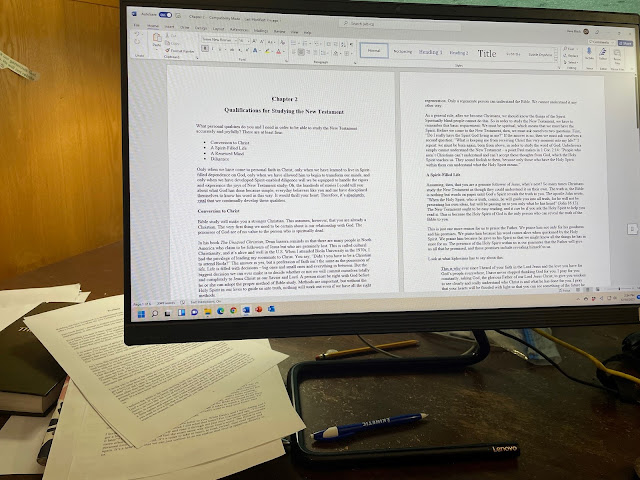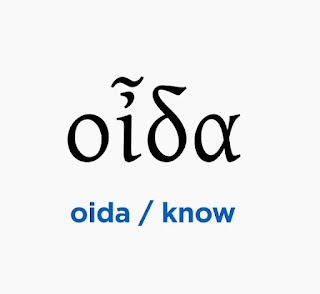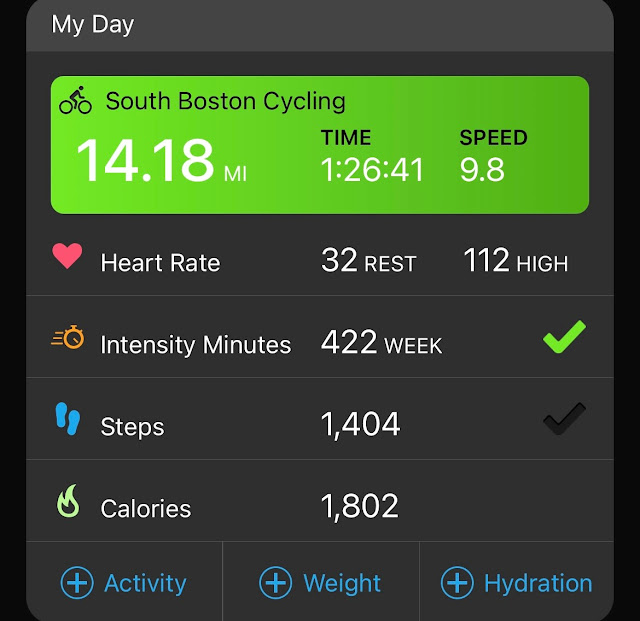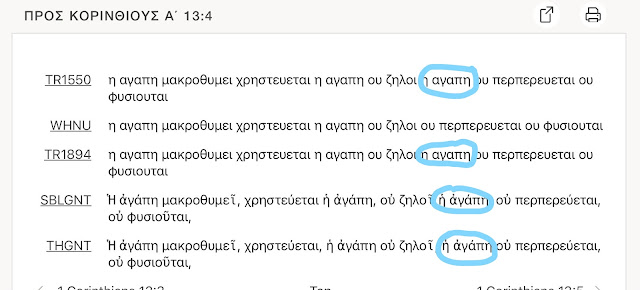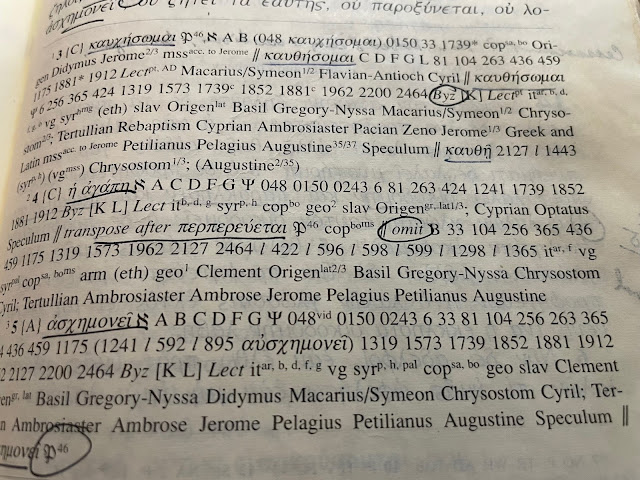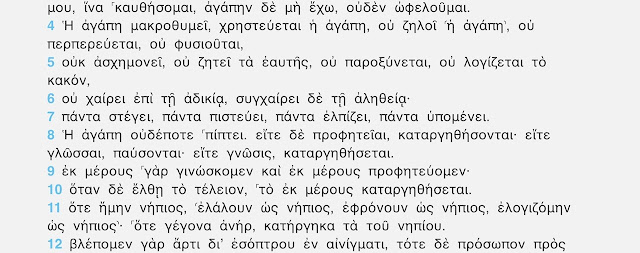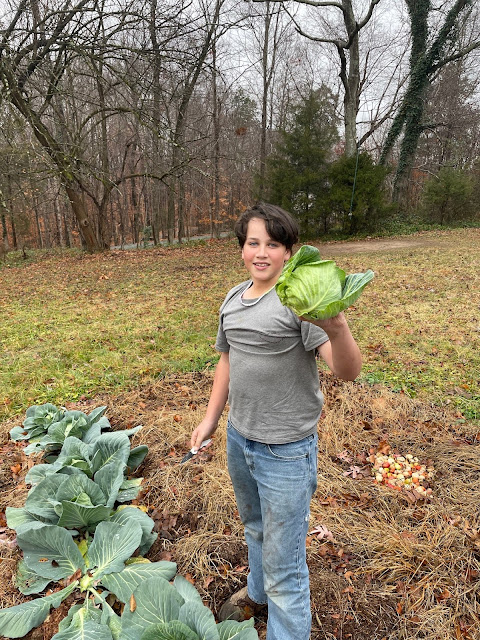Look at it. I cannot believe it. There's about a 100 percent chance I will post this to my blog.
Friday, December 31, 2021
Can We Trust the Gospels?
So much speculation and skepticism! Such were my thoughts after reading a recently published introduction to New Testament methods. The Gospels "are not even ostensibly objective accounts." "It is unlikely that Jesus ever delivered the 'Sermon on the Mount.'" Matthew was "probably dead" when the Gospel of Matthew was written. "Both Matthew and Luke improve Mark's syntax." (Are we still using that canard?) Mark's ending cannot possibly be original. We cannot know who wrote John.
I agree with those who say that the best term to use to define a Gospel is "theological biography." It is history plus commentary, narrative along with interpretation. However, this fact does not make the Gospels less historical or biographical. Scholars have expended much energy trying to determine the specific circumstances behind each of the four Gospels. This matter (called the Synoptic Problem) is somewhat subjective. In my book Why Four Gospels: The Historical Origins of the Gospels, I put forth a theory that disagrees with the leading view of our day, namely that our earliest Gospel is Mark's, later used by Matthew and Luke. I do so because I am a contrarian and obscurantist. Actually, I disagree with this view because church history is against it.
The early church fathers are unanimous that our first Gospel was Matthew's. Moreover, Clement of Alexandria states that those Gospels containing the genealogies of Jesus came before the others. He's referring, of course, to Matthew and Luke. This order perfectly fits the historical setting of the early church. Matthew's Gospel was written first because it met the needs of the earliest Christian community in Jerusalem, which was composed mostly of Jews. Luke's Gospel, however, was needed as soon as the Good News of Christ began to spread among the Gentiles. Mark's account seems to have been composed later still during Peter's stay in Rome. Finally, the Gospel of John, which church history dates around the year 96, was needed to supplement the other Gospels by more forcefully bringing out the deity of Christ and his union with the Father. We thus have four stages in the development of the Gospels:
- The Jerusalem stage under the direction of Peter.
- The Pauline mission stage.
- The Roman stage.
- The Johannine supplement.
No overarching hypothesis is possible for solving the Synoptic Problem. One thing is certain, however. The four Gospels are completely trustworthy and accurate portrayals of the life and teaching of Jesus Christ. As these Gospels circulated throughout the ancient world, the Spirit of God guided the earliest Christians to accept them. This four-dimensional presentation adds a richness we would not have possessed if we had had only a single narrative of Jesus' life.
I Guess I'll Give It a Try
Now here's a reality check: trying to cook a pot roast for the first time.
Should be finished in 8 hours. Wish me luck.
He Will Never Let Go of Your Hand
365 days. Gone forever. Where do we go from here?
If you're like me, you're thinking about your goals for 2022. I'd like to recommend we do two things before we set any goals. Pray, and act.
If you don't know what you should do in the new year, ask God. He's the only one who knows the details. So ask him to help you make good decisions and guide your steps. If you are afraid, tell him. Tell him how much you need him on the journey.
After you have prayed, you must act. When God tells you what to do or where to go, you must follow. Your action demonstrates that you are moving forward even if you don't know how everything will turn out.
When Becky died, I believe God was saying to me, "Do something with this." He was telling me that I was to use my struggle for good. In fact, he specifically led me to climb the Alps and do a fundraiser. The result was $25,000 for cancer research. I began to see how God was weaving a tapestry through my life. I now look back and see how God has always has a plan for my life and was piecing my life together, not tearing it apart.
There is no recipe in life to keep us from pain and suffering in 2022. That's why God wants us to keep our focus on him. God's word, firmly rooted in the soil of our lives, is the best remedy for tough times. My greatest prayer for 2022 is that God would use me as a vessel through which to speak words of encouragement and hope to others. I am thankful that through this blog I have the opportunity to speak up for him and to live every day for him. Writing has been a big part of the healing process in my life and a task that takes me deeper in my relationship with God. God comforts us so that we can comfort others. This gives purpose to our suffering. I am thankful, through it all, for my deeper trust in him.
When I climbed the Alps, I had a guide who never left my side. Instead of picturing myself alone on the mountainside of life, I like to picture my hand in Jesus' hand, and the climb is not so difficult. There is a special strength borne out of time alone spent with God.
My friend, keep your eyes focused on your Guide. Trust that he will open the way before you. Enjoy his presence. When you are unsure of the next step, he will be there. Walk (or climb) by faith, not by sight. Trust God for each and every step. He will never let go of your hand.
Thursday, December 30, 2021
Qualifications for Studying the New Testament
What do you on rainy days? Write, of course.
Do you realize that the more you put things off, the bigger the snowball becomes and the harder it is to get started again?
Today I'm working on chapter 2 of my forthcoming best-seller The Bible and Flying Saucers. Oops. Looks like that title is already taken. Ok, then. Back to How to Make the New Testament Come Alive! Chapter 2 is titled, "Qualifications for Studying the New Testament." I list 4 of them:
- Conversion to Christ
- A Spirit-Filled Life
- A Renewed Mind
- Diligence
Have I missed anything? Reformed theology? Loves the Tampa Bay Bucs? Hates the Bucs?
Don't worry, I do cover prayer later on in the chapter. I also suggest something I'm not sure many books mention: for crying out loud, SLOW DOWN. In the earliest manuscripts of the New Testament, the absence of spaces between words was not perceived as a hindrance to effective reading. Just the opposite. As you read, your eyes had to slow down and so did your brain. Every word lingered in your mind. But enough about that.
Seriously, do let me know if I've missed anything. I promise to turn all suggestions I agree with all helpful suggestions to the improvement of the book.
John Stott on Rom. 12:9
"It may seem strange that the exhortation to love is followed immediately by a command to hate. But we should not be surprised. For love is not the blind sentiment it is traditionally said to be. On the contrary, it is discerning. It is so passionately devoted to the beloved object that it hates every evil which is incompatible with his or her highest welfare."
Jay Kim on Weekly Communion
"I am greatly encouraged by the shift more and more churches seem to be making in recent years, placing Communion at the center of their worship gatherings. From non-denominational megachurches to denominational, high-liturgy churches, communities all over the country seem to be moving in this direction, shifting from sporadic 'Communion Sundays' to inviting people to the table every time they gather to worship. This isn't a trend or a fad; it is a necessary return to the meal that has historically been the centerpiece of Christian worship."
Remember Gratitude
My, oh my, ladies and gentlemen, time to wrap up, not another week or another month, but another year. Can you believe it -- 2021 is rapidly coming to a close! What are you grateful for? What am I? I say this all the time, but I truly believe that gratitude is a game changer in life. It can change your entire perspective in a nanosecond.
Can you recall the good old days when you just graduated from high school and were filled with hopes and dreams? How you couldn't wait to see how your life unfolded before you? How you prayed and sought counsel from others as to the right path the Lord wanted you to take with your time on this earth? When you had your whole life ahead of you and felt there were no limitations on what you could accomplish? Oh my, I remember those days like they were yesterday.
Fast forward to 2021. What a great year it was for me career-wise. There are a million things to be thankful for. One amazing thing were the number of courses I taught this spring, which turned out to be my final semester of fulltime teaching. My normal course load has always been 3 classes per semester, but between January and May I taught 7 -- count 'em! -- 7 classes, 6 on campus and 1 in Israel via Zoom, followed by 4 weeks of teaching summer school. It felt great. Yes, retirement came as a surprise to me, but that's the thing about gratitude. We are to give thanks in all circumstances of life because that's God's will for our lives (1 Thess. 5:18). The true measure of a man's character is how he deals with adversity. A recurrent theme of my life in the past year has been to show gratitude whenever I can no matter the circumstances. Life can throw us for a loop sometimes, but it's infinitely easier if we're grateful for the good and look past the setbacks. I have a good friend who is always seeing the good in all that is going on. His text messages are such an encouragement and model for me. Gratitude really does matter. As a 69-year old, with a little bit of life behind me, I am truly convinced that if you're grateful for your current state in life, no one can take your inner joy away from you.
Gratitude wins, each and every time.
We mustn't cave in to the whims of the world. We must remain grateful. This old body of mine sometimes struggles to pound the pavement, but I am so grateful for the days I can get outdoors and enjoy the beauty of God's creation. Life truly does get better with age because we begin to see how the small things in life have as much value as the large accomplishments. We must remember gratitude, for if we don't we will become desert islands in the middle of the ocean, alone and lonely. I thank God for everything I have and own and thank him for giving me a family that supports my dreams of running in some really challenging races. With struggle comes growth, and having that perspective gives you a chance to change and grow.
Dear friend, remember gratitude. This makes you a better person to yourself and others. Always find ways to enjoy the journey. Take nothing for granted, ever. Embrace the disappointments of life. You will be stronger and better because of them. I still believe what I have always believed, that God is extraordinarily good, and that his presence in our lives is like nothing else on this earth. My prayer for you is not only that your 2022 will be filled with many good things, but that even in the most disappointing moments you will find the deep and enduring power of gratitude.
Wednesday, December 29, 2021
God's Word, Our Word
Nothing is more wonderful than the Bible. We can build our lives on the promises of God. As we read in Heb. 4:12-13, that word is alive! It speaks to all people wherever they live.
The Bible also demands a response. God's word is a discerner of our thoughts and intentions. And one day we will give an account of ourselves before God. In that day, nothing will escape him. As we see below, God's word (logos) of revelation will be answered by our word (logos) of explanation.
A new year prompts questions. Sometime, maybe this coming year, Jesus will return as King and Judge, and he alone will sift the wheat from the chaff in my life. Jesus didn't say when that would be, he just told us to live in anticipation of it at all times.
I don't know about you, but I think it's time I had an honest, no-nonsense, face-on-the carpet talk with the Lord. Does he reign supreme over every detail of my life? I want to live in anticipation that he could come back tomorrow. Or today. I want to be ready.
Tuesday, December 28, 2021
Moving from "With" to WITH
This morning in my Bible time I was bumping along in the Vulgate when I saw an interesting preposition in Gal. 1:18:
Apud is not the normal word for "with" in Latin. Then I read this verse in Luther's translation:
Again, bei is the not the usual word for "with" in German. And the Greek?
You guessed it. Pros doesn't usually come to mind when we think of "with." I immediately thought of John 1:1, where the second clause reads "and the Word was with God." Here, for the idea of "with," I might have expected "sun" or "meta" or "para." But pros is used instead.
Likewise, the Vulgate has apud and Luther has bei. In all three languages, these words seem to have a sense of personal intimacy that the other words for "with" lack. If I should say, "Ich bin bei Familie Schmidt," my use of "bei" implies that I'm not only "with" the Smith family but staying in their home, enjoying their company. Likewise, when Paul went up to Jerusalem, he stayed with Peter, undoubtedly in his very home.
No major English translation that I know of adequately brings across this nuance of pros in John 1:1. They translate the Greek simply as "the Word was with God." C. B. Williams, however, produced his own private translation of the New Testament in 1937. It's called "The New Testament in the Language of the People."
Here's how he renders John 1:1:
In the beginning the Word existed; and the Word was face to face with God; yea, the Word was God Himself.
I love it. It's one thing to be merely in the presence of someone. It's another thing to be enjoying close fellowship with that person. At this Christmas season, aren't you grateful for the people who've allowed you into their hearts with open arms? Do you know how to tell if someone's that intimate with you? They let you walk right into their house with a sink full of dirty dishes and their hair a mess. We all need people like that.
The Swiss are as cordial and friendly as any Americans I've ever known. They're just more, say, reserved about it. It took several months before Becky and I were invited into someone's home for supper after church when we lived in Basel. That's a really big deal over there. When speaking German, you even change the words you use to talk with one another. You are now on a familiar, even intimate, basis with that family. How sweet that is. These people are now part of your inner circle. People in your inner circle are not just any people. They visit you in the hospital and you can call them when you get a flat.
Sometimes it's easy to forget that each of us needs a Savior -- not to mention a good old-fashioned friend to encourage us, help build us up, and even explore our pain with us. Become the friend you would like to have. It takes time to develop this kind of closeness, to move from "with" to WITH. But it goes much faster when we make the first move.
Monday, December 27, 2021
Another Book on Linguistics?
I am a schizophrenic when it comes to the subject of linguistics. I have an overabundance of passion for the field. For instance, three of my books have the word "linguistics" in their titles. This doesn't include the journal articles I've written in which I've tried to approach a New Testament text from a linguistic point of view. I have a ridiculous number of books on the subject in my library. You get the picture.
On the other hand, I am a downright pessimist when it comes to the application of linguistics to biblical studies. We are not living in the day of A. T. Robertson, where linguistics was basically morphology and little else. You can only do so much with apophony and ablaut, with Grimm's or Verner's Laws. Some of my concerns about how we do linguistics today in evangelical circles are discussed in this interesting video.
The speaker lists 5 pros and 5 cons of why a person should study the field of linguistics.
PROS:
- You will gain a fuller understanding of language.
- You will learn what makes us human.
- You will be able to follow your own interests.
- You will get an access to different ways of doing science.
- You will not just learn about linguistics. You will learn how to do linguistics.
CONS:
- Studying linguistics is not a vocational training.
- Linguistics has internal conflicts.
- Linguistic terminology is a mess.
- Most linguistics texts are terrible to read.
- Linguistics combines the worst of the humanities and the natural sciences.
Now let's be clear. If you has asked me in the 1980s to write a book that attempted to integrate linguistics with the field of New Testament Greek, I would have told you to find someone qualified for the task. I've never taken a course in linguistics, never earned a degree in the field, never started a school of linguistics. The reason I did write such a book was that no one else more qualified than I seemed to be interested in doing that. Today, we have the opposite situation. As in textual criticism, we have an embarrassment of riches. Assessing their value, on the one side there are books on New Testament Greek linguistics that helpfully walk our students through an astonishing number of subjects they need to be familiar with. On the other side, I see a failure on the part of writers to communicate effectively with their audiences. As the speaker in the video says:
It would be unfair of me to say that all linguists are terrible writers. What I can say is that many of the foundational texts that you'll have to read are just plain awful.
The man doesn't mince words. But he is right. This is why new introductory textbooks are needed going forward. Beginning students don't need more SBL papers. "Rabbi, I want to see." Blind Bartemaeus was asking for one of the most basic of human needs. Maybe I'm exaggerating, but my guess is that many students are pleading for basic books that smooth out the internal conflicts in the field, standardize the nomenclature, and are readable and engaging. If I'm taking my cues from many mainstream evangelical linguists, then only experts and Ph.D. students care about linguistics. What the what? I can't shake the idea that there are many beginning students out there who would appreciate learning how languages work.
Will I be writing another book on linguistics? Not on your life. I've paid my dues. So for now, I'll just kick my feet up and watch to see what happens. In 1988, when I published Linguistics for Students of New Testament Greek, I was a lot more impudent than I am today. I owned my temporary insanity and published a book that, by God's grace, is still in print 33 years later. But that can't last forever.
Okay there. I've said it. Now who will take up the mantle?
Sunday, December 26, 2021
Dallas Willard on Becoming Disciples
"The greatest issue facing the world today, with all its heartbreaking needs, is whether those who, by profession or culture, are identified as 'Christians' will become disciples -- students, apprentices, practitioners -- of Jesus Christ, steadily learning from him how to live the life of the Kingdom of the Heavens into every corner of human existence." Dallas Willard.
Memories
I think it's funny how skewed our memories from childhood can be. I got this pic from my daughter the other day.
As you know, she and her husband have just been stationed on Oahu. They were checking out the beach where I grew up. I know you're probably admiring the sandy shore and the islands in the background. Me? I see only the waves breaking on the horizon.
In Kailua, the reef hardly ever broke. Most of the waves were shore break. But every once in a while the waves were so big that they would actually break a mile off shore. As soon as they hit the outer reef of Kailua Bay they provided the best waves you could possibly imagine. If I had seen this view when I was 16, it would have meant one thing: my friends and me jumping on the Hobie Cat with our boards and sailing out to the Mokulua Islands, parking the boat, and enjoying a couple of hours of perfect rides. As I said, waves like these were special. You surfed them maybe twice a year.
Are my memories distorted? I mean, I used to think Honolulu was at least 100 miles from Kailua. When I go to Oahu today, I realize the distance is much shorter. It's really only about 10 miles, the distance I ran yesterday. One of my fondest memories of my childhood took place at this very beach. Here I am at the age of 8 in line to be baptized.
That day, God began the hard work of changing my life. Not only is baptism a symbol, it's a prototype of discipleship. That day I had begun connecting the dots of what God wanted to do with my life, but it was only a beginning. I'm still connecting the dots today. If I didn't grasp it then, I'm getting it now: "putting Christ first" doesn't mean giving God an hour of time and a dime out of a dollar and spending the rest of my life in any way I like. Paul didn't say, "To me to live is Christ first." No, Christ is the First and the Last, the Author and the Finisher, the Beginning and the End, the Alpha and the Omega. We live "from faith to faith."
Still, it all started that day in Hawaii when I realized I needed a Savior. And of all the things I'm thankful for right now, the connection that step of faith made between me and my heavenly Father is right there at the top of the list.
I know, I know. When you're little, things always look bigger than they really are. And I'm sure that memory fades over time. But some memories last forever.
Saturday, December 25, 2021
Today's Long Run
Marathon training rolls on, even on Christmas Day.
For developing the aerobic engine, the long run works like magic. Today's long run transpired in Farmville, VA.
I love to go easy, like today. I also love to go hard on race day. Right now it's time for recovery, which means a good book and a warm fire.
Onward and upward, getting ever closer to our 2022 races!
God's Gift for You
The wise men said, "We have seen his star in the east and have come to worship him" (Matt. 2:2).
I wonder, have you seen his star?
There are plenty of stars in the sky. We don't see them anymore, blinded as we are by city lights. We don't see the constellations and the planets and the Milky Way above us because we are so focused on our tiny, transient sparklers.
Then there are other kinds of stars, and these we see only too easily -- movie stars, athletic stars, political stars, even religious stars -- and never have these stars been more superficial than today. They want nothing to do with the star the wise men saw. Jude calls them "wandering stars for whom the blackness of darkness is reserved" (Jude 13). Satan himself is a fallen star, a Lucifer ("Light-Bearer") fallen from heaven.
Christ, however, is the Bright and Morning Star, the Daystar, the Star out of Jacob, and he is still shining brightly in all of our darkness. When the wise men said, "We have seen his star," they weren't content to say a few nice words about it. They came to him in repentance and faith. They worshipped him and we too must bow down before him and confess him as Savior and Lord.
Dear reader, you are so loved. Eternal life is indeed the gift of God. We are saved by simple faith that receives Jesus and confesses him as Lord. But there must be a total commitment. Worshipping the Star means giving him all we are and have. When we do this, everything changes. The wise men "went home another way." Anyone who comes to Christ goes another way from there on -- not our way but his way.
If you haven't already done so, I pray that on this Christmas Day you will come to worship Christ, and receive him as your Lord and Savior, the one who loved you and gave himself for you when he died for your sins.
If you are already a follower of the Lord Jesus, I don't need to remind you that civilization is facing its darkest winter in a long time. The vultures have gathered for the carcass. People cry "Peace and safety" but sudden destruction still comes. May we remember that as Christians we are pilgrims and strangers. Our home is not here. The darker the days, the sooner our Lord's appearance. The night is far spent, the Day is at hand, and our redemption draws nigh.
Much love to you all,
Dave
Friday, December 24, 2021
Forthcoming Hebrew Books
Can you read this?
Two of my books are currently being translated into Modern Hebrew. Above is my name. I've spent the day reading through the Hebrew translation of one of them. Never thought I would see this happen. So much thanks to the translators. I do pray that these books will be an encouragement to Hebrew-speaking believers not only in Israel but wherever they live in the world. I'll let you know their titles as soon as I'm able.Oh My, Those Dialects!
Me: "I know German."
Me: Arrives in Basel.
Me: Weeps.
- "Danke" becomes "Merci."
- "Vielen Dank" becomes "Merci vilmal."
- "Hallo" become "Grüezi."
- "Tschüss" becomes "Adieu."
- "Guten Appetit" becomes "En Guete."
Liebe Schweiz -- Du bisch de Bescht!
Thursday, December 23, 2021
OIDA!!!!!
Language nerds like moi love neologisms. The Coronavirus has popularized a plethora of words and phrases that we don't normally use in English. A few examples:
- Quarantine
- Asymptomatic
- Social Distancing
- Contact Tracing
- N95
- Zooming
- Quarantini (a cocktail)
Here's a new pandemic word that's recently appeared in Austria, especially in Wien (Vienna). It's "oida." You say, "That ain't new. Even a beginning student of Greek understands that oida means 'I know.'"
But this is a different oida. OIDA is an acronym for a series of Coronavirus-related rules that Austrians are expected to follow.
- "O" stands for "Obstand hoitn" (Abstand halten). English: "Keep your distance."
- "I" stands for "Immer d'Haend' woschn" (Immer die Haende waschen). English: "Always wash your hands."
- "D" stands for "Daham bleiben" (Zuhause bleiben). English: "Stay at home."
- "A" stands for "A Masken aufsetzn" (Eine Maske aufsetzen). English: "Put on a mask."
There you have it:
Oida.
So if someone asks you, "Did you know that?", now you can say "Oida!"
P.S. I really love studying the German that is spoken outside of Germany. It's so fascinating how the language works in other places. Als ich in Wien war, hatte ich wirklich grosse Schwierichkeiten, die Leute zu verstehen. Oesterreichisches Deutsch hat doch seinen Charme. Ich selbst finde Wien eine absolute Vorzeigstadt.
Viel Glueck im Umgang mit Corona, y'all!
Today's Cross-Training on the Bike
Yesterday was a running day. Today was a bike day.
Like you, I love getting outdoors.
I'm only a billion marathons away from qualifying for Boston, but a man can dream, right? All I need to do is keep training, keep improving, and keep ignoring logic. O well, I failed philosophy in college.
Tomorrow is for weightlifting. Then, on Christmas Day, we are warming up to the mid-60s, which will make perfect weather for a long run. I'd like to try and get in 15 miles.
As I often say, I'm not a gifted runner, but I am tenacious and stubborn.
A Christmas Book Giveaway
For Christmas I am giving away a copy of my beginning grammar.
My email address is black@sebts.edu. Let me know if you would like to have this copy. All you have to do is tell me why you would like to read the New Testament in Greek. I will read all entries and then announce the giftee on Christmas day.
Merry Christmas all!
Three Pitfalls When Learning Greek
Today I want to talk with you about what I believe are the three main pitfalls when studying Greek. They are:
1. "I could never learn Greek."
2. "I don't need to learn grammar."
3. "Just teach me vocabulary."
Let's examine these one by one. In the first place, I want to be absolutely clear that it doesn't take a smart student to learn Greek, just a hardworking and motivated one. My job as a teacher is much more than disseminating information. The goal is to help you overcome each and every hurdle until you have gained an ability to read your Greek New Testament with the use of a lexicon. Yes, it's going to take hard work on your part, but I'm here to help you succeed.
In the second place, never minimize the importance of grammar. The living language/instant immersion approach has really grown in popularity in the past few years but it has its place and time, and in my opinion that's not at the beginning of your study. Of course, the living language/instant immersion approach is how you learned to speak English as a baby, but that process took years and years. You're building a grammar framework from absolute zero, and this is really tedious and time-consuming. Most of us simply don't have the time to do that. There has to be a more efficient way to learn Greek. As adults we have many advantages over a baby in how we go about learning languages, and we need to leverage those advantages whenever we can. That's why learning basic grammar is so useful.
Finally, why can't we just learn vocabulary and forget about all this grammar stuff? To answer this question, let me give you an example from German:
Ein netter Lehrer gab seinem Student ein kleines Buch als ein Geschenk.
A nice teacher gave his student a small book as a gift.
One of the biggest differences between German and English is that in German there are going to be certain words that take tiny changes on the ends. I've marked these changes in our sample sentence:
Ein netter Lehrer gab seinem Student ein kleines Buch als ein Geschenk.
These are called declensions. The fact is, you're not going to able to speak German unless you're able to make these slight changes. In other words, there is no one-to-one vocabulary swap between English and German. You can't just learn the words "nice, "his," and "small" and then string them all together. Yes, you have to put them together, but you also have to make all of these very little changes. Greek works exactly the same way. There's a whole system for this called the case system.
So my job as a teacher is to break this whole task of learning Greek down into manageable parts. You have to start at the beginning and slowly move forward. When you take karate, you don't go from white belt to black belt overnight. You go from white belt to orange belt to blue belt to yellow belt etc. until you get to black belt. In my books and classes, principles and patterns of grammar will be uncovered gradually and systematically, and grammar will actually make sense.
I not only love Greek, I love teaching it to others. My books on Greek are designed to demystify and simplify complex grammatical topics. I'd love to have you study with me. My beginning textbook is available at Amazon. In addition, you can watch my 24 instructional videos for free on YouTube. My goal is to help you achieve the level of proficiency you desire and have fun while you're doing it!
Wednesday, December 22, 2021
Year in Review
Time to celebrate the goodness of the Lord. Here's my:
Year in Review
Total number of workouts in 2021:
301.8
Total number of miles:
1,784.1
Total number of days:
192
Total number of calories expended:
1,655,000
Average weekly workouts:
4
Average weekly distance:
26.2 miles
Average weekly time:
4 hours and 51 minutes
Meister Eckhardt once said, "If the only prayer you say in your life is 'Thank you,' that would suffice." Thanks to all of you for putting up yet again with all of my boring blog posts in 2021. I value you desperately and marvel at your goodness to me. As always, love to my quirky, grace-filled family. Thank you for giving me the freedom to be me despite all of my zany hobbies. Finally, I am thankful to you, Jesus, for reminding me that I still have an oar to grab in this life. I have known you since I was 8 and have never felt alone. And now there is a new year to be greeted and a new chapter of the tale to be written, a tale that is but a prelude to an endless story of grace to unfold throughout all eternity.
Languages Are Too Difficult to Learn
Just back from a 5 mile run. The day has turned out to be beautiful.
Earlier in the day I had a conversation with a few locals at the Bojangles in South Boston. When I started my run I couldn't get that conversation out of my head. I had been reminded that all languages contain a variety of ways to express itself depending on gender, age, social status, standards of formality, region, etc. Most languages, including English, have a "high" literary register and a "low," more colloquial register. Virginia is blessed with a hodgepodge of styles. From west to east they are called Appalachian, Piedmont, and Tidewater. The Piedmont dialect is spoken where I live. Brits would feel right at home here.
I love to hear Piedmont spoken. And, because I live here, I will occasionally try to speak it when I'm in a brave mood. Linguists call this style-shifting, which refers to the intentional use of different language varieties. Contrast that with code-switching -- the intentional use of two different languages. This is what happens when a local boy goes back to Hawaii and switches to Hawaiian Pidgin, or when he returns to Basel and switches from High German to Swiss German.
One thing I've noticed about German is how different it can be depending on whether you are writing it or speaking it. In writing, you say "Er sagte," but in the spoken language you say "Ich habe gesagt." Actually, you would probably say "Ich hab gesagt." The tendency in spoken German is to "swallow the endings" -- "Ich geh," not "Ich gehe."
One of the main differences between written and spoken German is the tendency to use the perfect more than the simple past when speaking:
Wegen des Wetters, bin ich zu Hause geblieben.
Because of the weather, I stayed at home.
Conversely, you would write, though probably not say:
Als ich nach Hause kam ....
Ich ging in dem Supermarkt ....
Als ich mit ihm sprach ....
One final example. Did you know that German has the equivalent of our colloquial use of "like"? Normally, "like" is a preposition meaning "similar to." "Like," however, can also be used as a discourse particle, as in:
I was like, "You are NOT coming with us," and he was like, "Oh yes I am."
In German, you use "Ich so" and "Er so," leaving out the verb "was."
Und ich so, "Ja, das ist komisch." Und er so, "Ja, oder?"
And I was like, "Yeah, that was funny." And he was like, "Yeah, for sure."
The one thing you don't say is:
Und ich war wie ("And I was like")!
The moral of the story is: Languages are too difficult to learn. Just kidding. The real moral of the story is:
Life's better when we appreciate how God made languages work. And, when it includes trying to learn a language other than our own.
Tuesday, December 21, 2021
Drummers Take Note
To any worship team drummers out there. You gotta watch this video.
When I think of Ringo Starr, the word complement comes to mind. Ringo sensitively complemented every Beatles song that was ever recorded. He always blended into the group and never tried to draw attention to himself. I am always amazed how, in today's music, the drummer acts as if he is a soloist and the keyboardists and guitarists are there to accompany him. It is impossible to imagine how Ringo could have been any more different from that. His drumming is always appropriate. Even in the song "Rain," the drum fills genuinely fit the music. He was never flashy, just solid and musical. I have never read that anyone had to tell Ringo how to play. He just played and the rest of the Beatles were perfectly fine with it. Just listen to him drumming on "Something." Or his famous drum solo on "The End."
Only four people in the world can be called a Beatle. Ringo is one of them, and for good reason. Many drummers today listen to themselves. Ringo listened to the band. That's why the other lads enjoyed having him in the band so much.
Word Order in Hebrew (and Hawaiian???)
I just found this book on my shelf.
I must have ordered it this year and then promptly forgotten all about it. It contains many fascinating chapters. The one on Hebrew word order was of special interest to me. The author waffles between saying that the unmarked word order in Hebrew is SVO (subject-verb-object) or VSO (verb-subject-object). He suggests that additional studies are needed on this subject.
On page 183, something stood out to me. The author shows how the world's languages can be categorized according to 6 (and only 6) possible orders: SOV, SVO, VSO, VOS, OVS, and OSV. The most common orders are SOV (= 45 percent of the world's languages) and SVO (= 42 percent). Then you have VSO (= 9 percent), VOS (= 3 percent), OVS (= 1 percent), and OSV (= 0 percent).
From my reading of Latin, it seems that Latin is basically an SOV language.
There are many exceptions, of course. The main one is the verb est. Here the verb tends to be placed between the subject and the complement.
In Hawaiian (a language I am trying to master), the verb "to be" is always implied. Nani ka pua means "The flower is pretty" ("Pretty [is] the flower"), while Nani 'o Kalena means "Kalena is pretty" ("Pretty [is] Kalena"). "My name is David" would be Kawika ko'u inoa ("David [is] my name"). "This island is Moloka'i" would be 'O Moloka'i keia mokupuni ("Moloka'i [is] this island").
Moving on to action verbs, Hawaiian has four patterns:
- Hana 'oe = You work. (Hana = work; 'oe = you [singular].)
- Ke hana nei 'oe = You are working.
- Ua hana 'oe = You worked.
- E hana ana 'oe = You will work.
We can summarize this as follows:
- Verb = simple action in present time.
- Ke Verb nei = ongoing action in present time.
- Ua Verb = past action.
- E Verb ana = future action.
Note that hana can be a noun ("work"), a verb ("to work"), and even a place name (many of you have probably driven the dizzying Road to Hana on Maui).
Here are a couple more examples:
- Hana au i ka hale = I work at home ("Work I at [the] home").
- Nana keia keiki i ke kiwi = This child watches TV ("Watches this child [at the] TV").
- Kokua ke kahunapule i na keiki 'ilihune = The minister helps the poor children ("Helps the minister [to] the children poor").
Notice the na before keiki in the third sentence. To pluralize a noun in Hawaiian, you simply add the word na. The noun itself does not change its form (unlike in Greek, Latin, etc.).
For fun, here's a brief description in 'olelo Hawai'i (the Hawaiian language) of the island where I was born and raised. Ke and ka mean "the," and 'O precedes all names. (My apologies for not being able to write the long mark [kahako] over long vowels.)
'O O'ahu keia mokupuni. 'O Honolulu ke kulanakauhale. He melemele ka waiho'olu'u no O'ahu. He lei 'ilima kona lei. 'O Kakuhihewa ke ali'i kaulana no O'ahu. 'O Ka'ala ke kuahiwi nani.
Here's the English:
This island is O'ahu. Honolulu is the town. The color of Oahu is yellow. Its lei is the ilima lei. The famous chief of O'ahu is Kakuhihewa. The beautiful mountain is Ka'ala.
In the map below, I've circled Mount Ka'ala.
By the way, in Hawaiian each consonant must be followed by a vowel. Hence my name, when transliterated into Hawaiian, becomes Kawika instead of Kawik. Other than the 5 vowels, Hawaiian has only 8 consonants: H, K, L, M, N, P, W, and the okina (glottal stop). As you can see, the "D" in David becomes "K," while the "V" becomes "W" (which often has the sound of a "V" in Hawaiian!). Feel free to call me Kaveeka!
To summarize: whereas English has an SVO word order, Hawaiian has a VSO word order. In Hawaiian, you hear the subject second. This sure sounds like Greek and Hebrew to me :-)
What Does "Teacher" Mean?
If English is based on German, Latin, and Greek, why am I called a "teacher?" Here is "teacher" in the languages I've mentioned:
- Lehrer
- Magister
- Didaskalos
Why don't we use in English, say, master (derived from magister) or didact? Since I didn't know, I consulted an etymological dictionary of English. What I found surprised (and delighted) me.
Our word teacher comes from the Old English taecan -- show, point out, demonstrate. The Proto-Indo-European root is deik -- show or point out -- as in the Greek verb deiknumi, "I show." I like that. It seems to support the notion that teaching is as much modeling as it is verbal instruction, maybe more so.
I give Thomas Hudgins a lot of credit for reminding me that Christian education is essentially likeness education. That's because most of us learn best by example. Jesus himself said that a disciple who is fully taught will be just like his or her teacher. I want so deeply to teach like that. Luke 6:40, quite literally, changed my life. It's one reason why in college I came up with a motto: Choose a teacher, not a course. It's why I took every course Professor Nikolas Kurtanek offered even when it wasn't required. I wanted to be like him. When God sent me to Basel, he sent me to be the son of a Doktorvater. We suffer loss, I think, when we place expediency and convenience over a true education. Taking a class just to take a class is ruining us.
Which brings me back to "teacher." A teacher is not simply a catechist, a moralizer, a pedant, an academician, an inculcator, a pedagogue. We teachers are coaches, guides, preparers, trainers, mentors, tutors. What does it communicate to my students when my office remains closed and inaccessible because I am protecting "my" time? Realizing our misplaced priorities is perhaps the ticket out of our awful educationism. Or at least it might start the engine.
Let's do the right thing, people.
Jesus, may there be less of me and more of you and your kingdom in my teaching this coming semester.
Beware the Latin Perfect!
I have a completely borked relationship with Latin. There are red flags everywhere. Here's one. The Latin perfect tense does the work of two categories: the present completed and the past simple! Spock this chart:
Notice how vidi can be translated either as "I have seen" or "I saw." In narrative, I have found the "I saw" pattern to be the more common one. Here are a few examples from Mark 14-15:
exierunt = they went (not they have gone)
veniunt = they came
assumit = he took
invenit = he found
oravit = he prayed
adduxerunt = they led
audivimus = we heard
interrogavit = he interrogated
How Latin managed to survive without what in Greek is called the aorist indicative is beyond me.
Monday, December 20, 2021
Christ, the True Center of All Worship
Today I was reading Howard Marshall's Some Considerations Concerning the Lord's Supper Today, which led me to jot down a few miscellaneous thoughts about the significance of communion. But first let me quote to you from Marshall:
In line with what appears to have been the practice of the early church the Lord's Supper should be celebrated frequently in the church, and there is good reason for doing so on each Lord's Day.
It's time we ask ourselves why evangelical worship, for the most part, centers on the preacher. The early Christians were celebrating weekly the resurrection of Jesus Christ and feasting in anticipation of his return (Acts 20:7). Marshall says:
The Lord's Supper in the New Testament is a meal. The appropriate setting for the sacrament is a table, and the appropriate posture in our western culture is sitting. To describe the central piece of furniture as an altar is completely unjustified in terms of the New Testament understanding of the meal.
(Some of us could replace "altar" with "pulpit.")
My understanding of the New Testament suggests that the future of the church lies, at least partly, in the recovery of the Lord's Supper as central rather than peripheral. True worship can't be reduced to a stage, a lecture hall, or a psychiatrist's couch. Our gatherings have the word "man-centered" stamped all over them. The center of all true worship is Christ.
(For more, see Seven Marks of a New Testament Church. Chapter 5, on the Lord's Supper, is titled "Christ-Centered Gatherings." And, in case you think I'm minimizing the importance of sound doctrine or faithful exposition of the word, see chapter 3, "Apostolic Teaching.")
Monday Mini-Update
Greetings, friends. It got cold here yesterday, and I don't really like to run in cold weather. Pretty much all I want to do is sit by the fireplace with a good book. Once it got a bit warmer, however, I shook off my sloth and went for an easy 4 mile run at the track. Yes, it does take a bit of motivation to get outdoors on a coldish day, but the payoff? Out of this world. I feel so much better after running. It's that odd paradox about exercise: the more active you are, the more energy you have.
Before running I warmed myself up with some Bojangles coffee while writing a few thoughts about the Lord's Supper. I may or may not publish it later on the blog.
By the way, Bo's really does have some great coffee, and cheap too.
Finally, here's the Lowa Alpine Expert GTX boots.
It's designed for mountaineers who spend a lot of time in snow and alpine environments. The boots feature a midsole made of polyurethane, which is a good material for cushioning but at the same time doesn't compress. Most importantly, they are automatically crampon compatible. The only problem is that the boots are back ordered, even at the Lowa store. Just another supply chain issue. I'm told the earliest I can get a pair would be March or April. Well, I hope to be climbing in late June. I really do need this pair of boots because they are the only brand that is wide enough for my feet. Here's what I think: if the Lord wants me to celebrate my 70th birthday by climbing the Alps again, it will get done. Hands down, high altitude climbing is one of the most adventurous things I've ever done. I was kind of afraid when I got to Zermatt, but my worries disappeared when I was able to hire one of Switzerland's best alpine mountain guides who saw to it I was safe and sound during all of our climbs. Plus, he spoke Spanish and I liked that. If I am able to make it back to Zermatt next summer, this is my goal -- the summit of the 4,027 meter Allalinhorn.
So that's all for now. I am a believer in not letting the cold (or supply chain issues) keep you from getting outdoors and being active. Come on, y'all. Get out there if you can.
New Greek Class to Start!
In one month I will begin teaching a new introductory Greek class on Monday nights. This is one of the most important ministries God has given me in my 45 years of teaching. The goal of all Greek instruction is to establish believers in the truth of the word of God. Leaders especially need to be firmly grounded in the Scriptures and must learn how to transmit what they themselves are learning to others. We have good translations, but you never get that direct encounter with the Scriptures, that intimate knowledge, without the original languages. So I give great emphasis to mastering both Greek and Hebrew. Greek helps us in the New Testament, of course, but also in our study of the Old Testament through our reading of the Septuagint. Conversely, Hebrew helps us with the Old Testament but also enables us to read the New Testament in a Hebrew translation. One of the best tools in this regard is the new Delitzsch Gospels translation.
I look forward to cordially welcoming each of the 27 students who have registered for the class and will make myself available to them both inside and outside of the classroom for encouragement and tutoring. The most dangerous part of social media is not its availability but what it so often distracts us from. The study of Greek takes a considerable amount of time and effort. May we, through the diligent study of God's word, become that Bride that inspires and changes the world.
A Word about the Text of 1 Cor. 13:4
In my copy of the United Bible Society's Greek New Testament, the preface says that square brackets "in the text enclose words whose presence or position in the text is regarded as disputed ...."
In Cor 13:4, the words he agape ("the love") occur three times. The last of these is enclosed in square brackets in my UBSGNT. Still, all editions of the Greek New Testament include the disputed words except, of course, Westcott and Hort's text.
Now look at the apparatus in my UBSGNT:
The omission of he agape is supported by only one Greek uncial manuscript, which is Codex Vaticanus (B), a manuscript that Hort consistently felt represented the original text in places of textual variation. One of my textual critic friends sometimes refers to the "hypnotic effect and Aleph and B." Here is a classic example. There is very little possibility that the reading of B here could be original, and, in my opinion, square brackets should never have been placed around these words. A simple footnote would have sufficed.
I have so much to say about this but I'll save it for my my chapter on textual criticism in my book on interpreting the New Testament.
Love Is a Verb
Public Service Announcement: There are no adjectives in 1 Cor 13:4-7 -- the verses I'm memorizing in Greek for the New Year. There are only verbs.
Paul doesn't say "love is patient." He says something like, "love patients [verb]" or (better) "love suffers long." I was discussing this with a friend recently. "Yeah," he said, "I really need patience right now. It seems like I'm having to wait forever for ____________ to happen." In a world where we want things NOW, that makes sense. But Paul isn't talking about counting down the days until you get married or have your first baby or get your doctorate. No, this patience is exercised toward people, not things. Notice the second characteristic of love that Paul mentions here: "Love is kind acts kindly." It's a verb, remember? Obviously, Paul is packing a one-two punch. You see, we can act with longsuffering toward people without actually doing anything positive for them. But is that the best way to handle difficult, high-maintenance people? It's not enough to give grace, though that's where you have to start. No, you ask yourself, "How can I best love this person who gets on my nerves?" Here you have multiple options, but simple acts of kindness will not go unnoticed.
Now, we need to be careful here. On the one hand, Paul is saying that love puts up with a lot. As he goes on to say, "Love doesn't demand its own way. It's not irritable or touchy. It does not hold grudges and will hardly even notice when others do it wrong" (TLB). True. But on the other hand, love "is never glad about injustice, but rejoices whenever truth wins out." So there's a fine line here. Yes, we are to prioritize keeping the peace over confrontation. But let's not enable people who demean and humiliate. Yes, long-suffering is required, but it's not grace to put up with constant bullying or neglect. Sometimes you need to walk away from certain toxic relationships because that's the loving thing to do both for you and for the other person.
As I memorize and meditate on these verses, I am praying for perspective on this short, fleeting life of mine. Who do I need to forgive? Where do I need to release a grudge? How can I better live at peace with all? What behaviors do I need to clarify to my loved ones that I will not put up with any longer? I'm asking Jesus to send light into my heart so that I can make decisions that lead to greater health and happiness. Frankly, who could ever lead a 1 Corinthians 13 kind of life without his constant presence and power?
Sunday, December 19, 2021
The Season for Music
Tonight was surreal. I got to listen to some of my favorite Christmas music in one of the Piedmont's most acoustical venues.
The program featured the Choral Society of Durham, the Amalgam Brass, and David Cole on the organ. While I completely get that great classical/sacred music is not everyone's cup of tea, it was nice to see the auditorium almost packed -- and not everyone had gray hair either.
As far as I'm concerned, Christmas is the season for joyous music. Who cares what kind of music lifts you up to God. For me, John Rutter's compositions like Gloria are beautiful, uplifting music. Love this choir! Such rich harmonies!
Merry Christmas everyone!
Saturday, December 18, 2021
Muffins and Cabbage!
I was in the mood to bake today so I took some muffins over to the boys' farm.
I came back with this nice-looking cabbage.
How do you cook your cabbage? I usually cut mine into wedges and then boil it. Add a little salt and butter and there you have it. Cabbage is the perfect food. It's loaded with vitamins and low in calories. Its fibers can also keep your digestive system working properly.
Want to give it a shot?





